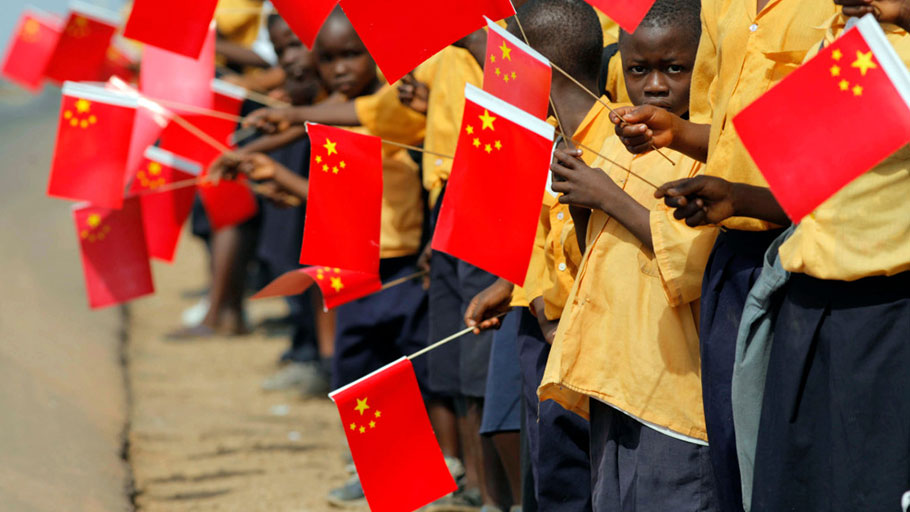Tian Chen, The Pathfinder International —
On Chinese New Year’s Eve, a group of Chinese friends and I were feasting on dumplings in Cape Town while watching the CCTV Chinese New Year Gala broadcasted live from Beijing. A song called ‘I have a date with 2035’ was on air. TF Boys, one of the most popular adolescent bands in China, were happily singing “We will achieve modernization in 2035…”, while a group of artists dressed in spacesuits danced on a dazzling stage.
As one of the most-watched shows on the state-owned China Central Television (CCTV) station, the Chinese New Year Gala is one of the government’s major tools for disseminating propaganda. The message in the 2035 song is clear: China is on track to a great future.
While the ladies at our dinner table in Cape Town were nodding their heads to the rhythm of the 2035 song, Uncle Wang, a project manager who had just visited a few construction sites in Cape Town turned to everyone and asked: “But what is modernization? I just know that Africa is not modern. I thought China had been quite modern for a while.”
It’s an interesting question. Since I was a child, I have often heard modernization mentioned in slogans. But I was never sure what modernization actually meant. I was curious about what it means to other Chinese, and asked each of my friends at the dinner table for their thoughts, and what kind of modernization they expect by 2035. I was offered amazing answers:
“There will be major lifestyle changes. Like now, we do cashless payments in China. There will be new innovations that change the way we live.”
“Artificial Intelligence is going to be a key thing. Robots will be cooking for us one day.”
“People can travel to different places through technology like…Bluetooth?”
“VR too, we’ll experience and sense the world in totally different ways.”
“We’ll be able to travel to other planets easily.”
Indeed, technology and innovation are at the core of President Xi Jinping’s plans for modernization. Part of this vision involves developing advanced manufacturing to reshape China into a manufacturer of quality, protecting entrepreneurship, and encouraging innovation. China is certainly moving in this direction. Huawei and Lenovo represent the rise of a new generation of Chinese companies focusing on innovation and quality, and China is already a leading technology provider in high-speed trains, cashless payments, and 5G communication infrastructure.
What does China’s modernization mean for Africa? China is providing generous infrastructural support to Africa, but this is often viewed as a form of economic colonization, or a relentless drive to secure access to the natural resources that it needs to maintain its economic growth. Because of this hunger for natural resources to feed its development, China knows that it cannot fully achieve modernization without Africa. The infrastructural work China implements in Africa puts China ahead in the queue for natural resource deals with resource-rich African governments. But while China is helping to build a future for Africa, it might also be taking another future away.
Besides natural resources, what Africa can offer China in return is what China never thought it would one day lack – labour. After China implemented its One Child Policy in the 1970s, the young workforce started to shrink in the following decades. On top of that, it is traditional for Chinese parents to offer financial support to their only child, to make sure they are well-educated, and to avoid sending them to factories, where working conditions are usually worrying. It is these labour-intensive factories which are moving to Africa, where the labour force is comparatively younger and cheaper.
However, training Africans to become highly-skilled workers is not usually among these factories’ priorities. Local Africans are mostly hired to do low-skilled jobs, under the supervision of Chinese workers and managers. While China is aiming to upgrade to high-value, capital-intensive industries, countries like Ethiopia have only recently started adopting labour-absorbing, export-oriented manufacturing.
The global trend of layered economic development demonstrated in the China-Africa partnership shows what the Japanese economist Kaname Akamatsu proposed for Asia in his flying geese paradigm: that underdeveloped nations could be “aligned successively behind the advanced industrial nations in the order of their different stages of growth in a wild-geese-flying pattern”. China intends to play the role of leading goose for Africa. But the world has become much more interconnected and flat since the information revolution, making opportunities much more equally accessible worldwide. Does Africa really have to go through what China went through to achieve modernization?
Of course, Africa as a diverse continent cannot be homogenised. Each African country needs to face their own specific “China question”. South Africa, the continent’s strongest economy, has to deal with a significant imbalance: China has been South Africa’s largest trading partner since 2009, but the vast majority of South Africa’s exports to China comprise raw materials, while the imports from China are mainly manufactured goods. Chinese investment in South Africa is slowly shifting from mining to property and the manufacturing industry, but that won’t correct the imbalance.
Djibouti, one of the smallest countries in Africa, is in a somewhat different situation: The country has embraced Chinese investments wholeheartedly and has allowed Chinese money to be funnelled into many sectors, from its free trade zone to its port infrastructure. In return, the country has accommodated a Chinese military base outside of its capital city, making many Djiboutians wonder where to draw the line in their strategic partnership with China.
Perhaps some African countries are still in urgent need of clear and specific plans for how to achieve their own modernization. As Ibrahima Diong, former regional coordinator for Africa at the World Bank points out, “China knows what it wants from Africa, but most African countries don’t have a strategy vis-a-vis China.” Policies to strategically direct and handle foreign investments need to be in place before any China question can be answered. China must also have a global vision for achieving Xi’s blueprint for modernization. Ordinary Chinese people may already be thinking about travelling to space in 2035, but China should avoid using its discarded past to shape Africa’s future. Instead, it should work closely with African countries to achieve real win-win partnerships in the long walk to modernization.
Tian Chen is a PhD candidate in Anthropology at The University of Cape Town researching into the cultural identity construction of the Chinese diaspora. As a student/teacher/researcher/traveler/B&B host, Tian has been studying and working in Beijing, China; Kowloon, Hong Kong; Belfast, UK; Delaware, USA; Dublin, Ireland; Adelaide, Australia; and of course his new hometown, Cape Town, South Africa (WHO: KOU: African Places, Chinese Faces)















